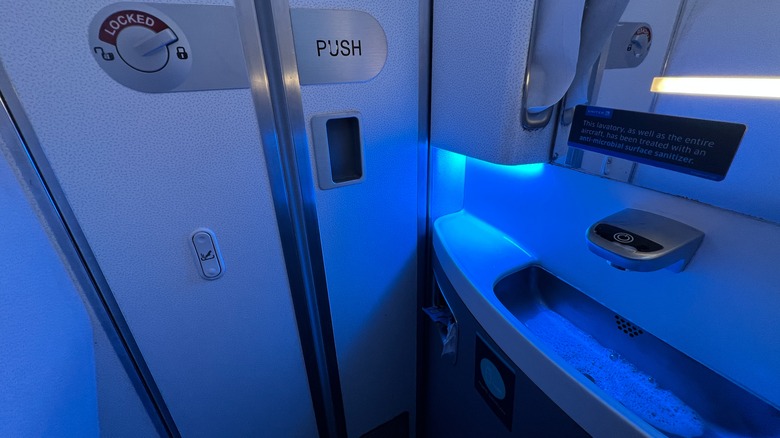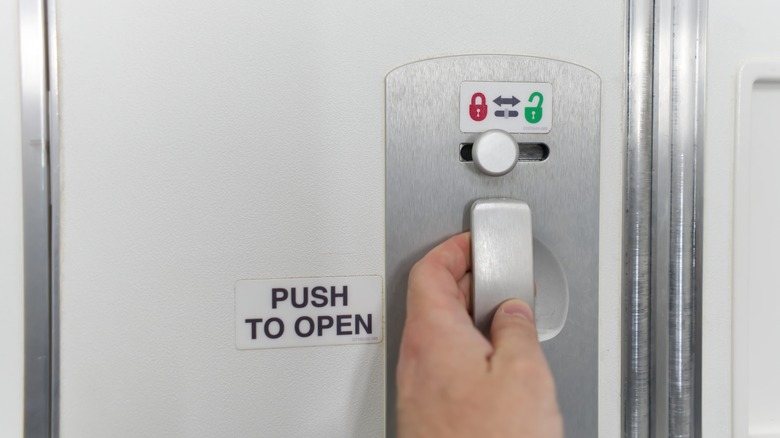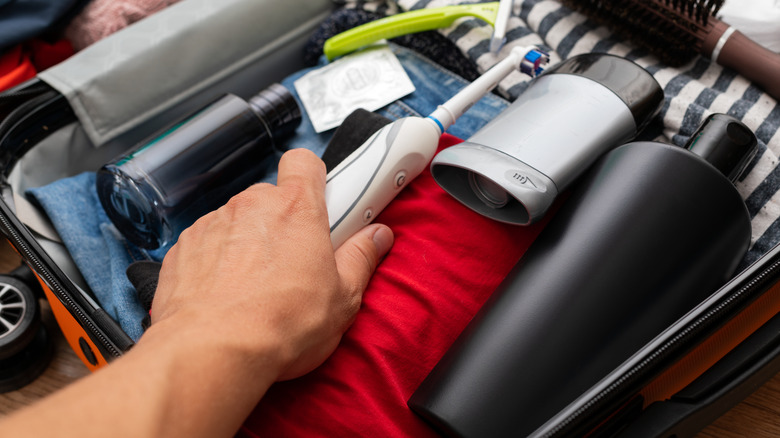The One Hygienic Practice To Avoid Doing In Plane Bathrooms, According To Our Expert
Staying fresh on long-haul flights isn't always easy. After hours of cruising through the clouds, your skin might feel dry, your clothes may look wrinkled, and, if we're honest, your breath might not smell so pleasant.
To get back to your minty baseline (and remove the in-flight grilled chicken still lingering between your teeth), you could grab your toothbrush and head to the lavatory after mealtime. However, just because you could doesn't mean you should. Explore spoke with Katrina Sanders, a registered dental hygienist and international speaker, about the downsides of brushing at 30,000 feet. As the expert shared with us exclusively, the water in plane lavatories might be useful when washing your hands, but it's not meant for brushing your teeth. "The water in the airplane bathroom is not potable, meaning it shouldn't be consumed," she revealed.
While the water found in your local tap is typically treated to specific standards, airplane tap water doesn't follow similar regulations. "[W]hen you introduce this unclean water into your mouth, it can certainly introduce other bacteria, yeasts, fungi, viruses or molds," Sanders explained. "Additionally, rinsing your toothbrush bristles with unclean water can harbor microorganisms and allow them to grow on the moist surfaces of the bristles." Yuck!
Airplane restrooms are teeming with bacteria
The dirtiest spot in your airplane seat is often the back pocket, but away from your assigned chair, the restroom is easily one of the germiest places in the entire cabin. With this in mind, you're better off avoiding brushing your teeth in the lavatory. "As we learned during the COVID-19 pandemic, germs are crawling everywhere, particularly in public settings and especially in areas where travelers from various parts of the world may interact," Katrina Sanders told Explore in an exclusive interview.
Often, viruses and bacteria are floating around, even if we can't see them — and that can include microbes from feces. "[P]articulates from fecal matter can enter the air in a bathroom particularly when the lid is not closed prior to flushing," the dental hygienist explained. "Fecal matter houses an incredible amount of bacteria, and when this bacteria is able to stick to your toothbrush bristles, you could potentially become very sick just from brushing your teeth."
If dirty air isn't enough to deter you, germy surfaces might be. Sanders shared that lavatory napkin dispensers, sink faucets, and other surfaces in airplane restrooms are covered in thousands of bacteria, viruses, molds, and other icky microorganisms. And, she added, not everyone washes their hands after using the toilet, meaning the door handle and other surfaces you touch before or while cleaning your teeth may contaminate your toothbrush.
How to clean your teeth the right way on a plane
It's no secret that brushing your teeth is good for oral hygiene. The American Dental Association recommends brushing at least twice a day, but if you're a frequent flier, traveling can sometimes interfere with your regular dental care schedule — especially if you actively avoid brushing up in the lavatory. Thankfully, Katrina Sanders revealed some safe alternatives for keeping your mouth clean mid-flight.
First, the dental professional exclusively shared one simple swap that can eliminate many bacteria and viruses potentially involved in standard brushing: a disposable, single-use brush. Throw a few of these ready-to-go brushes in your carry-on bag to use as needed, and consider using a bamboo option to be more environmentally friendly. For rinsing after, Sanders suggested swishing a little bottled drinking water. Besides brushing, the dental hygienist also noted that gum (look for products containing xylitol or other antimicrobial ingredients), mouthwash, antimicrobial mouth sprays, and teeth-friendly probiotic lozenges can work in a pinch.
Even if it's not in use during your flight, it's crucial to keep your toothbrush clean while traveling. Sanders likes toothbrush head covers, which block harmful microorganisms. "Also: if you become sick while traveling, please do remember to throw out the toothbrush in your travel kit, because reusing the same toothbrush could also make you sick," urged the expert.


